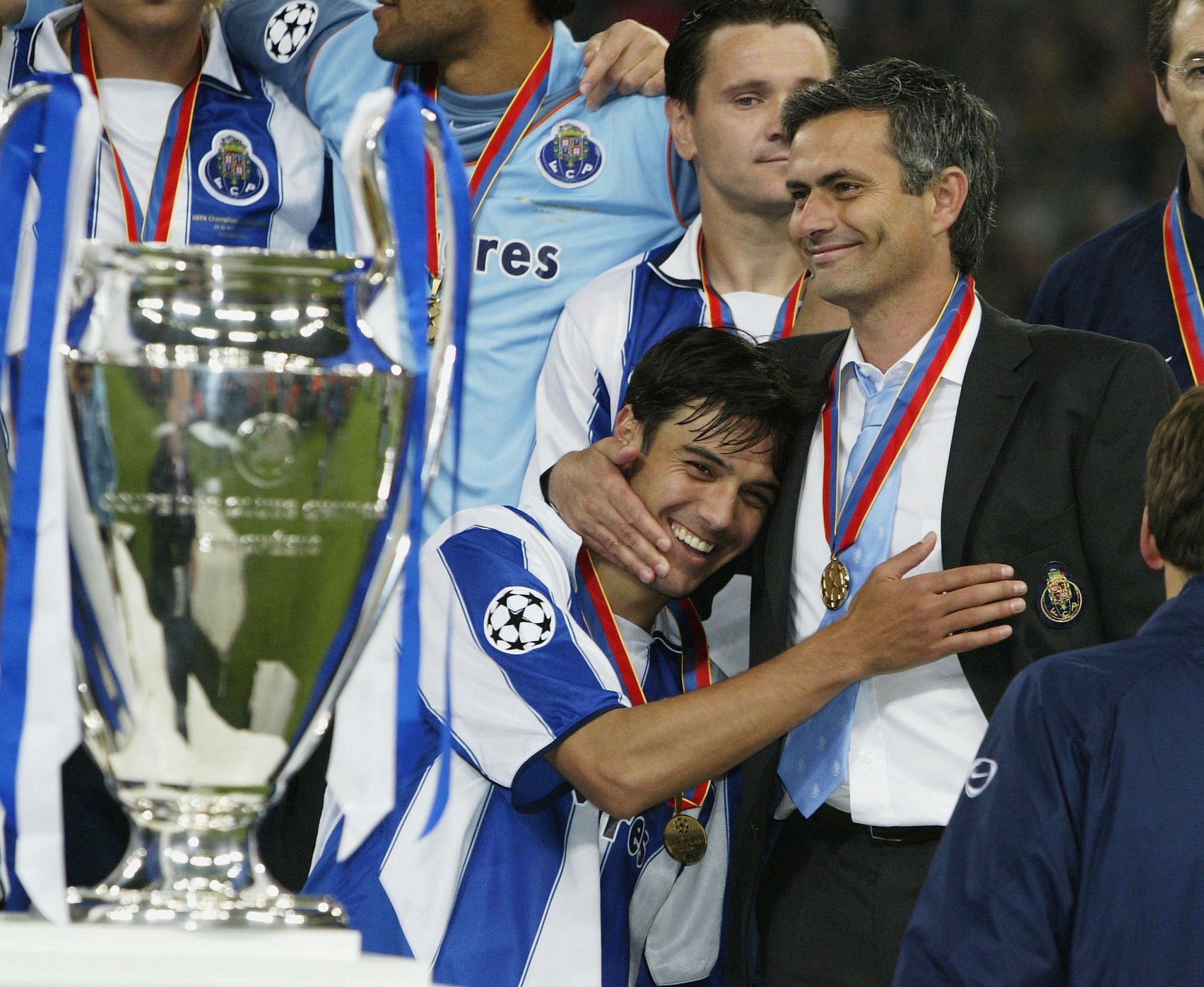
As Jose Mourinho prepares for Manchester United's Europa League final against Ajax on Wednesday, he should feel a surge of confidence.
Mourinho is a prolific winner in cup finals, lifting 11 of a possible 13 trophies since 2003, at Porto, Chelsea, Inter Milan, Real Madrid and Manchester United. And his European record is perfect.
Two Champions League trophies and one UEFA Cup make the Portuguese coach one of the most successful on the continent. Here, Newsweek takes a look back at those finals:
Celtic 2-3 Porto (after extra time)
UEFA Cup—May 21, 2003
Eighteen months into his tenure at Porto, a fresh-faced, grey-tinged Mourinho reached his first European final. The UEFA Cup final, now known as the Europa League, took place at the Olympic Stadium in Seville, Spain, and Mourinho's opposition was Martin O'Neill's Celtic.
Celtic had lost out to Rangers in the Scottish Premiership and the team wanted that trophy—it took an extra-time winner from Brazilian Derlei to earn Mourinho his first trophy on the European stage. Porto had to overcome a spirited Celtic team that came from behind twice before the killer blow.
O'Neill's team contained the likes of Neil Lennon, Paul Lambert, Stiliyan Petrov and Chris Sutton but it was the prolific Swede Henrik Larsson who kept dragging Celtic back into the game. Derlei put Porto ahead in first half stoppage time but Larsson got the equalizer two minutes into the second half.
Deco, the Portuguese playmaker, was the key man in Mourinho's midfield. He played a crucial role in Porto's first and then assisted Dmitri Alenichev for the second. Three minutes later, Larsson equalized again with his second header of the game.
In typical Mourinho fashion, the game was feisty. In extra time, Bobo Balde was sent off for Celtic after a scything challenge, and then Nuno Valente saw red for a second bookable offense. Derlei's winner saw Mourinho become one of Europe's most promising young managers.
Monaco 0-3 Porto
Champions League—May 26, 2004
In his last game as manager of Porto, before taking up his role at Chelsea, Mourinho took Porto to the pinnacle of European football. Just one year after winning the second tier of Europe's club football tournament, he then conquered the continent. And, this time, he did it in style.
Mourinho has garnered a reputation for negative football but, in Gelsenkirchen at the Arena AufSchalke, his team bulldozed through a Monaco team that had beaten both Real Madrid and Chelsea on the way to the final.
Carlos Alberto put the Portuguese side in front just six minutes before the break and then two goals in four minutes in the second half, from Deco and then Alenichev, ended the French side's hope of a comeback.
Mourinho famously threw his winners' medal into the crowd at the end of the game and walked off early from the celebrations. Two days later, he announced he would be leaving the club and taking over at Stamford Bridge.
Bayern Munich 0-2 Inter Milan
Champions League—May 22, 2010
Mourinho's most successful year in his decade of management, which saw him win the treble in Italy with Inter Milan, ended with the Portuguese writing his name in the history books.
Mourinho became just the third man to win the Champions League with two different clubs, joining Ernst Happel and Ottmar Hitzfeld. Two goals from the rejuvenated Diego Milito, one in either half, won the game at the Santiago Bernabeu for Mourinho against Louis van Gaal's Bayern Munich.
The Inter team that dominated both domestically and in Europe had all the hallmarks of Mourinho's DNA. The solid, unyielding power of Lucio and Walter Samuel in defense with the protection of Javier Zanetti and Esteban Cambiasso in front of them, two defensive-minded midfielders.
As a defensive block, they irritated and frustrated the creative elements in Van Gaal's side, including Arjen Robben and Thomas Muller. But Inter had deadly players of their own that could break down teams. Diego Milito's 30 goals at the age of 30 were crucial in securing the treble, alongside Samuel Eto'o and with the creativity of Wesley Sneijder in midfield. And it was Eto'o, the Cameroonian forward, who fed Milito in the 70th minute to put Inter out of reach for the German team.
At the final whistle, Mourinho embraced Van Gaal, his mentor at Barcelona in the 1990s, and celebrated with the Nerazzurri faithful.
Uncommon Knowledge
Newsweek is committed to challenging conventional wisdom and finding connections in the search for common ground.
Newsweek is committed to challenging conventional wisdom and finding connections in the search for common ground.
About the writer
To read how Newsweek uses AI as a newsroom tool, Click here.








